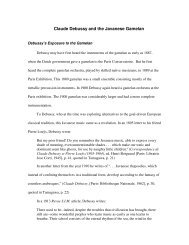Music Preference 1 - Brent Hugh's personal and business web pages
Music Preference 1 - Brent Hugh's personal and business web pages
Music Preference 1 - Brent Hugh's personal and business web pages
Create successful ePaper yourself
Turn your PDF publications into a flip-book with our unique Google optimized e-Paper software.
<strong>Music</strong> <strong>Preference</strong> 23<br />
greater depth. The unknowledgeable person (the immature neural network) has accumulated<br />
from the statement a crude <strong>and</strong> inaccurate knowledge, which, if it is to be useful, must be greatly<br />
refined by future knowledge.<br />
"Our decreasing ability to accept new things is essential in the making of sophisticated<br />
taste"; if attitude remains too flexible <strong>and</strong> new knowledge is not measured against previously<br />
held knowledge <strong>and</strong> beliefs, "we can only perceive things crudely." (Mok, para. 2). That is the<br />
insight the study of neural networks gives to the theory of learning.<br />
Why different models of attitude change may apply to different areas of attitude. The neural<br />
network model of learning also suggests why the different hypotheses of attitude change may<br />
apply to different areas of attitude. In areas in which a high degree of refinement in learning is<br />
desirable, the impressionable years model or the aging stability model would apply. The<br />
decreasing variability of preference over the lifespan allows highly refined learning to develop.<br />
In areas in which quick adaptability to changing situation is necessary over the entire lifespan,<br />
<strong>and</strong> in which this quick adaptability is more important than refined <strong>and</strong> detailed knowledge, the<br />
lifelong openness model would apply.<br />
In music <strong>and</strong> most other arts, detailed knowledge <strong>and</strong> refined taste are highly valued in most<br />
cultures. On the other h<strong>and</strong>, there are few survival situations in which quick adaptability in<br />
artistic tastes would be crucial. Thus, musical taste tends to follow the impressionable years<br />
model or aging stability model.<br />
A contrasting area of attitude is that of political policies. Markus (1986) found in studying<br />
opinions of policies over a nine-year time period that subjects' opinions of policies often<br />
changed, yet the subjects most often did not believe that they had changed their opinions.<br />
Subjects simply altered their recollections of previous opinions to match current opinions. Here





